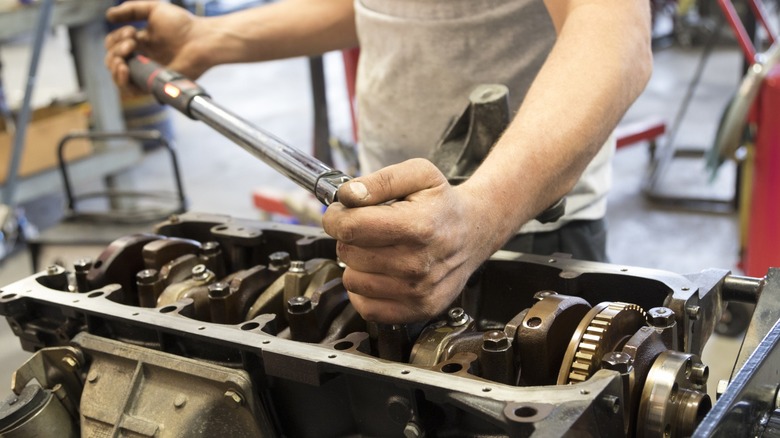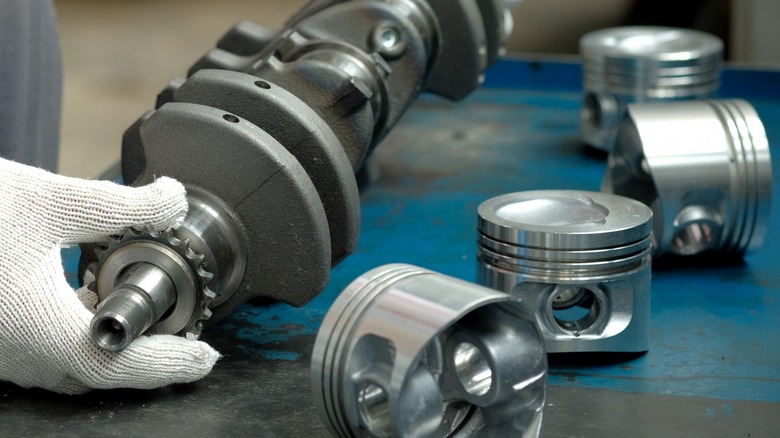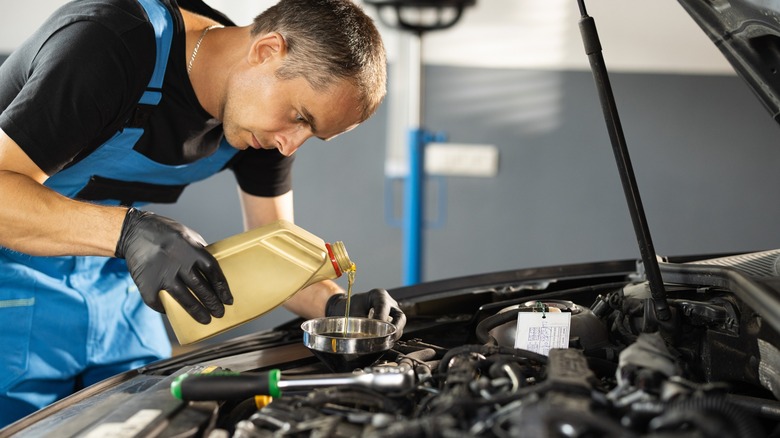5 Things You Should Know Before Buying A Remanufactured Engine
Besides a collision or carjacking, engine failure is the worst thing that can happen to your car. If it happens to your vehicle, you'll probably need a remanufactured engine due to the cost of new crate engines and the time required to rebuild yours. You might assume that the extended warranty sold to you by the finance person at the dealership guarantees you a new engine. However, examining the fine print will likely reveal the warranty company's ability to opt for a remanufactured replacement.
While a remanufactured engine may or may not be as good as a new engine fresh from the factory (more on that in a bit), it's better than one that doesn't run. Plus, if your engine failed before the warranty expired, it's probably better than the engine you bought with your car. If you are on the cusp of buying a remanufactured engine, heed these five things you should know first.
What is a remanufactured engine?
A few options exist for buying a remanufactured engine, but all should come from wrecked cars with otherwise sound engines. The most basic is the short block. A short block will include the engine block and the rotating assembly housed within it: crankshaft, connecting rods, and pistons. Short blocks are good options for high-performance car owners using aftermarket cylinder heads.
Next, the long block is essentially a short block with the addition of cylinder head(s) and associated valve train components. Long blocks are typically the best option for balancing cost and ease of installation. Installing a remanufactured long block requires reusing or buying new engine peripherals, such as intake manifold, starter, water pump, fuel injectors, ignition system components, etc.
Buying a complete engine can simplify the installation process as it often comes ready to put in the vehicle. However, don't assume anything and ask detailed questions, like, "What else is needed to complete the installation?" You'll often need to provide the alternator, starter, and other accessories.
Not all remanufactured engines are the same
Ideally, a remanufactured engine is just that, remanufactured. Before it's sold, it should be completely disassembled, thoroughly cleaned, and inspected. The crankshaft's main and connecting rod bearing surfaces and cylinder bores should be within the manufacturer's specifications or machined within allowable limits. Reusing the original engine parts requires careful inspection for wear, cracks, and other damage.
In addition, a quality short block will contain new bearings, pistons, and piston rings. Long blocks get the same treatment with the addition of a new camshaft, timing chain or belt, and refurbished cylinder heads. The remanufactured heads will have new intake and exhaust valves, valve springs, and new or reshaped valve seats.
Purchasing a used engine to install directly in a vehicle is a common practice. However, a complete-remanufactured engine implies a higher standard. It should undergo the same rebuild process as the long block but include everything it needs to run. Again, it's critical to ask questions so you understand what the engine includes and what you'll have to provide.
Unfortunately, not all remanufactured engines are the same. Another route taken by some rebuilders skips the teardown and rebuild process. Instead, if the engine passes a compression test, they'll give it a power wash, touch up the paint, and sell it. Buying a low-mileage unit this way isn't all bad, and it could save you some money, provided they're upfront with the process.
What is the remanufactured engine's warranty coverage?
Any remanufactured engine should include a warranty that covers defects in materials and workmanship provided by the remanufacturer. The warranty periods vary over a wide range of months and mileage and often include variances depending on vehicle use and type. For example, Advance Auto Parts says its remanufactured gasoline engine warranty covers "personal use passenger vehicles and light trucks" for three years, while commercial and one-ton vehicles are only covered for 12 months. Modifiers like these aren't exclusive to Advance Auto Parts because every warranty includes fine print.
Often, the list of items not covered by the warranty is more specific (and longer) than the covered items. Be sure to read and understand the warranty contract before spending your money, even if that means asking someone with more knowledge to look at the warranty. Examples of the fine print include the warranty limiting the payment for labor charges and coverage for a single failure.
The Advance Auto Parts example limits labor costs for replacement to a maximum of 10 hours. The warranty also imposes a $50 per hour "Warranty Rate" on garages with a business license and pays $25 per hour to anyone else. The single failure clause limits the warranty coverage to the originally purchased remanufactured engine and excludes coverage for replacement units.
Regular maintenance is required to maintain the warranty
Regular engine maintenance, including scheduled oil changes and proper engine coolant/antifreeze testing, is often required to maintain the remanufactured engine warranty. Understandably, the engine remanufacturer can't be held responsible for an improperly maintained engine. It's crucial to keep accurate records of all of the maintenance you perform or have done.
Your warranty should include specifics concerning routine maintenance. It could be a schedule unique to your purchased engine or the same as indicated in your vehicle owner's manual. Whether you have the work done by a professional or do it yourself, keeping accurate records and receipts is the best way to prevent problems later.
Sometimes, your freshly remanufactured engine will require maintenance beyond routine tasks like oil changes and coolant flushes. Be aware of any special requirements associated with your engine, such as break-in periods and valve train adjustments. If you're uncomfortable performing more complex mechanical procedures, coordinate with your engine installer or other qualified mechanic.
What happens if the remanufactured engine fails under warranty?
Knowing your responsibilities when a remanufactured engine fails under warranty is as important as knowing what the warranty covers. If your engine loses oil pressure or overheats, you'll receive a notification through the dashboard warning lights or gauges. You should stop the car in the closest safe place when this happens. If you continue driving a car without oil pressure or while overheating, you risk severe engine damage and voiding the warranty.
Engine warranties often require the diagnosis of any failure by a qualified mechanic. If it's determined that the failure occurred due to materials or workmanship provided by the remanufacturer, the warranty will replace the engine. However, in addition to any labor-cost overages, you could be responsible for the cost of any fluids, gaskets, and filters not provided with the original remanufactured engine purchase.
Not all remanufactured engines or their warranties are equal. It's best to take some time to research several options before buying a remanufactured engine. Choosing a reputable company helps ensure years of worry-free ownership.





